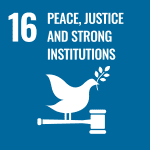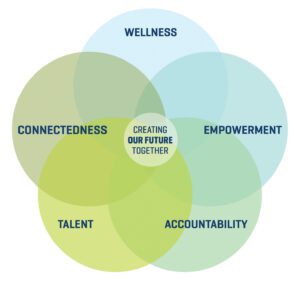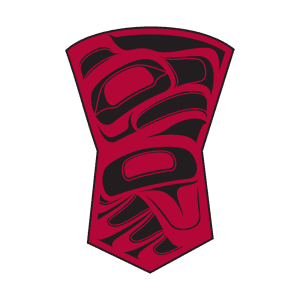
SDG 16 challenges us to promote peaceful and inclusive societies and ensure equal access to justice for all. For BCIT this begins on campus through providing safe and inclusive spaces essential for learning. SDG 16 is closely tied to SDG 10: Reducing Inequalities and SDG 3: Good Health and Well-being.
Administration & Operations
BCIT is committed to providing the necessary resources and procedures to ensure the Institute responds effectively to any emergency or disaster, so students and employees can learn and work in a safe environment. The Emergency Management Program coordinates and integrates all activities necessary to build, maintain, and improve the Institution’s ability to mitigate and prevent, prepare for, respond to, and recover from natural and human-caused emergencies or disasters.
Safety

BCIT has developed resources to help students, faculty, staff and guests become Safety Wise. Safer walk is a program where anyone can call to have campus security walk with them anywhere on campus and is available 24 hours a day, 7 days a week (24/7). They will wait with you until your ride comes.
There are emergency telephones on campus so assistance can quickly be summoned. They are found in parking lots, walkways, elevators, and in-house telephones. BCIT Security Communications Centres are operational 24/7 to answer calls for assistance. Emergency telephones can be used to report emergencies, request a safer walk, request first-aid, report suspicious activity, and to request assistance (e.g. for car problems, lost, etc.).
Security
The BCIT Security operations office is staffed 24 hours, and is ready to respond to campus emergencies, complaints and security-related assistance requests. The BCIT Security patrol is contracted to Paladin Security Group Ltd. The Institute is patrolled 24 hours a day by security officers. The patrols are conducted on foot, in vehicles and on bicycles.
As the link between the Institute’s Senior Leadership and British Columbia’s government, the Board of Governors (highest governing body) interprets how BCIT implements provincial policies and priorities. The Board of Governors oversees the business interests, management, and long-term development of BCIT and is made up of a range of elected and appointed individuals, representing different interests in the institution, including students, academic staff and non-academic staff:
- one peer-elected academic staff member (3 year term)
- one peer-elected non-academic staff member (3 year term)
- two peer-elected students (1 year term)
- at least eight members appointed by the Lieutenant-Governor in Council.
There are also several non-voting Board members, including the President of BCIT, the Chair of the Education Council, and the Chair of the Board of Governors.
BCIT’s Education Council (EdCo) focuses on academic matters, including policy setting, awards, academic standing and exams, and advises the Board of Governors on developing educational policies, programs or priorities. The Council consists of twenty members comprised of elected academic staff, non-academic staff and students, and appointed educational administrators all elected for terms of one or two years.
There are two unions representing the interests of academic and non-academic staff at BCIT:
- The BCIT Faculty and Staff Association (FSA)
- B.C. General Employees’ Union (BCGEU)
The FSA and BCGEU both work to advance the employment interests of academic and non-academic staff and improve working conditions at BCIT through representation on committees, negotiation with BCIT and advocacy for their members. FSA membership is made up people drawn from across the Institute’s academic schools and from the many Departments that provide academic support. The BCGEU membership is also made up of academic staff and non-academic support staff.
Employees have the opportunity to participate in governance of their union through election of members to their unions Board of Directors. The core work of each union is to bargain for good collective agreements every few years, ensuring fair wages and benefits, and keeping employees safe at work. The contractual agreements between BCIT and the unions are contained in three collective agreements.
The FSA 2021-26 strategic plan is composed of four priority areas, each with a related goal. Each priority area has a number of objectives. Priority Area #1 is Reducing Inequalities with the goal to identify and address inequities across their membership. Learn more at SDG 10: Reducing Inequalities.
FSABCGEU
The British Columbia Institute of Technology Student Association (BCITSA) is a student service and advocacy organization at BCIT with a mandate to enhance student life. Their programs and services are designed to benefit and support all students. Students lead the organization and govern the affairs of the BCITSA. The Board of Directors is composed of 12 elected Student Executives and Student Councillors from each of the different Schools at BCIT and is responsible for overseeing the Student Association and advocating for students. Elected Student Executives represent and advocate for students on the Board of Governors and Education Council.
The BCIT Strategic Plan articulates three Commitments that represent our primary areas of activity and accountability. We are intent on being a people-focused organization that delivers future-proof applied education, amplifying our impact through globally relevant connections.
Key initiatives align with these commitments to create a framework for action and decision making. Interwoven in much of the Strategic Plan, and highlighted in our core values, sustainability is explicit in—and integral to—these initiatives:
- Process and system redesign: redesign processes, systems, and structures to enhance our agility and effectiveness and to embed sustainability
- Augmented and sustainable environments: cultivate exceptional learning environments and communities through technology and sustainable campus development
- New models of collaboration: reinvent how we work with industry and peers to drive economic, social, and environmental prosperity in British Columbia and beyond
Together, these confirm our intention to embed sustainability in our education and applied research activities, across our campus operations and facilities, and in our interactions with stakeholders beyond BCIT.

BCIT’s first People Vision is a plan that describes our goals and priorities in respect of our people. The Vision seeks to articulate our objectives and priorities in empowering our employees. It creates a framework for our efforts to support their development, create an inspiring workplace, and honour their commitment to the Institute. There are five interdependent core areas with accountability being one of them.

In May 2019, BCIT launched An Indigenous Vision: A Framework for Action and Accountability. The Vision complements the three commitments in BCIT’s Strategic Plan. Furthermore, our implementation plan is structured around the principles of the Colleges and Institutes Canada Indigenous Education Protocol – a document that provides a vision for how colleges and institutes can strive to improve their practices and better serve Indigenous peoples.
Endorsed by the Board of Governors, fully supported by the Leadership Team, and developed through extensive consultation with the broader BCIT community, the Indigenous Vision and its associated Implementation Plan provide the roadmap for moving forward.

We recognize that inequitable resource consumption is at the heart of climate change and is an urgent global challenge. Although climate action and adaptation will remain at the forefront of our academic, operational, and partnership efforts, we will also strive to uncover the deeper systemic causes and to address other sustainability challenges.
Through shaping the knowledge and actions of our students and partners in the workplace, we aim to inspire and mobilize change across industry and society, underpinned by best practices across our campuses.
To achieve this ambition, we know that we must:
- articulate a shared understanding of our role as a polytechnic institution in being part of the solution, empowering students, faculty, and staff to contribute and make a difference;
- advance the intellectual capital and operational excellence that stimulate public dialogue and purposeful translation to practice in industry; and
- create the institutional capacity to train the workforce of tomorrow.



